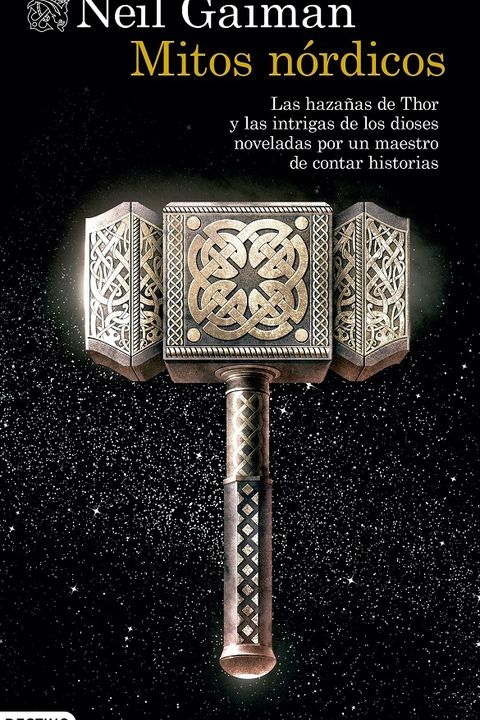Citas de Mitos nórdicos
when something goes wrong, the first thing I always think is, it is Loki’s fault. It saves a lot of time.
The Norse myths are the myths of a chilly place, with long, long winter nights and endless summer days, myths of a people who did not entirely trust or even like their gods, although they respected and feared them.
That was the thing about Loki. You resented him even when you were at your most grateful, and you were grateful to him even when you hated him the most.
He is tolerated by the gods, perhaps because his stratagems and plans save them as often as they get them into trouble.
Loki makes the world more interesting but less safe. He is the father of monsters, the author of woes, the sly god.
There were things Thor did when something went wrong. The first thing he did was ask himself if what had happened was Loki’s fault. Thor pondered. He did not believe that even Loki would have dared to steal his hammer. So he did the next thing he did when something went wrong, and he went to ask Loki for advice.
Cease your weeping!" he said. "It is I, Loki, here to rescue you!"
Idunn glared at him with red-rimmed eyes. "It is you who are the source of my troubles." she said.
"Well, perhaps. But that was so long ago. That was yesterday's Loki. Today's Loki is here to save you and take you home.
The fun comes in telling them yourself—something I warmly encourage you to do, you person reading this. Read the stories in this book, then make them your own,.
Loki's green eyes flashed with anger and with admiration, for he loved a good trick as much as he hated being fooled.
There is no end. It is simply the end of the old times, Loki, and the beginning of the new times. Rebirth always follows death.
Do you wonder where poetry come from? Where do we get the songs we sing and the tales we tell? Do you ever ask yourself how it is that some people can dream great, wise, beautiful dreams and pass those dreams on as poetry to the world, to be sung and retold as long as the moon will wax and wane? Have you ever wondered why some people make beautiful songs and poems and tales, and some of us do not?
It is a long story, and it does no credit to anyone: there is murder in it, and trickery, lies and foolishness, seduction and pursuit. Listen.
It is a long story, and it does no credit to anyone: there is murder in it, and trickery, lies and foolishness, seduction and pursuit. Listen.
That is how the worlds will end, in ash and flood, in darkness and in ice. That is the final destiny of the gods.
In their huge bedroom that night, Tyr said to Thor, "I hope you know what you are doing."
"Of course I do," said Thor. But he didn't. He was just doing whatever he felt like doing. That was what Thor did best.
Here is the last thing, and a shameful admission it is. When the all-father in eagle form had almost reached the vats, with Suttung immediately behind him, Odin blew some of the mead out of his behind, a splatter wet fart of foul-smelling mead right in Suttung's face, blinding the giant and throwing him off Odin's trail.
No one, then or now, wanted to drink the mead that came out of Odin's ass. But whenever you hear bad poets declaiming their bad poetry, filled with foolish similes and ugly rhymes, you will know which of the meads the have tasted.
Loki was trying to look serious, but even so, he was smiling at the corners of his mouth. It was not a reassuring smile.
I tried to imagine myself a long time ago, in the lands where these stories were first told, during the long winter nights perhaps, under the glow of the northern lights,.
I learned the Norse gods came with their own doomsday: Ragnarok, the twilight of the gods, the end of it all. The gods were going to battle the frost giants, and they were all going to die.
Had Ragnarok happened yet? Was it still to happen? I did not know then. I am not certain now.
One of the dwarfs walked in front of Thor to get a better view of the prye, and Thor kicked him irritably into the middle of the flames, which made Thor feel slightly better and made all the dwarfs feel much worse.
